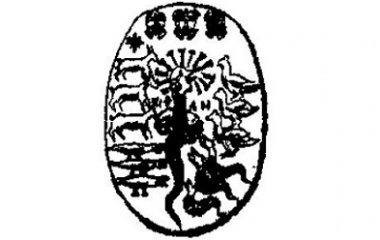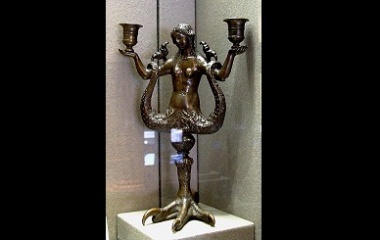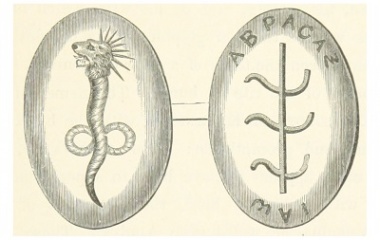The word abracadabra is commonly used in magic shows, often just before a rabbit is pulled out of a hat. The root of the word, however, may have come from the name of a Gnostic god, Abraxas, the Supreme Being. According to Gnostics, the term is magical and represents infinite power and possibilities.
What Is Abraxas?
Abraxas is a mystic word made up of Greek letters. It is referred to as Abrasax in some sources, which may have been the earlier spelling. The word was believed to have magical properties and was inscribed on ancient charms and amulets. In the 2nd century AD, the early Gnostics personified the word as their Supreme Deity. Abraxas is symbolized on ancient talismans as the head of a cock on the body of a man with a whip in one hand and a shield in the other. The symbol is also engraved on gemstones called the Abrasax stones.
Origin
Abraxas may have no root in known speech, according to an etymologist in 1891, but was more likely used in a mystic or divine sense. It is posited that the term may be a combination of abrak and sax, two Egyptian words meaning the honored or hallowed word, that appear in ancient texts including the Holy Book of the Great Invisible Spirit and the Greek Magical Papyri. Basilides, an early Gnostic teacher from Alexandra in Egypt, gave the name Abraxas to god, or the Great Archon, the god of 365 spheres or heavens – for each day of the year. Sources cite the seven letters represent the seven classic planets (Sun, Moon, Mercury, Venus, Mars, Jupiter, and Saturn). The original letters of the word in Greek add up to the number 365.
In Catholicism
The writings of the Catholic bishop Irenaeus became central to Christian theology in the 2nd century. He believed that 365 heavens were created, and that the angels from the last heaven then created our world. In his work, he claims the ruler of all 365 heavens is Abraxas. In the 4th century, one of his cohorts, Epiphanius, claimed Abraxas was the being above all things. He further claims that Abraxas sent Christ to Earth, not the Maker of the World. The Catholic Church later maintained Abraxas was a pagan god and labelled him a demon, according to J. Collin de Plancy’s Infernal Dictionary. He goes on to describe the Basilidians as heretics.
In Mythology and Psychology
In the early 19th century, mythographer Sir Godfrey Higgins alleged the name may have had ancient Druid origins. He also stated that Abrasax may be the root of the word abracadabra. The word Abrasax, in his view, was a corruption of on an ancient Egyptian word – a magical incantation meaning hurt me not. The hieroglyph which represented the concept was usually inscribed on an amulet or charm. He also related that
a name so sacredly guarded, so potent in its influence, should be preserved by mystic societies through the many ages . . . is significant.
In his book, the History of Freemasonry, Higgins draws attention to the reverence bestowed on the word, which signifies the adorable, blessed name-the unutterable word.
Carl Jung was a modern Gnostic and psychologist. He claimed Abraxas was a higher god than the Christian god and was actually a combination of god and the devil in his book The Seven Sermons to the Dead, published in 1916. Jung was known for his explorations of the soul or psyche and regularly entered visionary states to acquire the mystical knowledge he sought.
Abrasax Stones
The Abrasax stones are ancient gemstones engraved with the word Abrasax, or the images of the god, or both the image and inscriptions. The stones also depict Abrasax with other Gnostic powers, the god with Jewish symbols; and with Persian, Egyptian or Grecian deities. The word Ablanathanalba is a magical word which appears on the Abrasax stones and in the magical papyri. Ablanathanalba means Thou art our father. The Greek Magical Papyri date back to the 2nd century and contain magic spells, rituals and formulas. One of the papyrus was titled Monad and contains an invocation to Abrasax.
Abraxas the Immortal Horse
Abraxas is also said to be an alternate name for one of Helios’ four immortal horses, and according to certain sources, draws Aurora, the dawn goddess, across the sky.
Abracadabra Magic Formula
Abracadabra was a term or formula used in folklore magic, an incantation against inflammation and fever. The etymology of the word may be found in Aramaic and is first documented in the writings of 2nd century Gnostic physician Severus Sammonicus. The word is inscribed on an amulet in a triangular form, worn for nine days around the neck and thrown into a river on the tenth day, whereupon the wearer should be healed. The magic formula, according to Sammonicus, had the ability to garner the support of benevolent spirits and thereby helped the healing process.
Gnosticism is a religious teaching based on gnosis, meaning secret knowledge that is used to achieve salvation and a return to our true spiritual origins, away from the physical universe and its evil. While we continue to be churned through the cycles of rebirth here on Earth, perhaps the magic, mysticism or religion of old or new can guide us back to our true origins and pure form, back to Abraxas.











This explains a lot about BTS’ music lol
His Abraxas our father creator God?